
-
 Luis Figueroa
Luis Figueroa
(Perú, 1928-2012)
Luis Figueroa nació el 11 de octubre de 1928, en el Cuzco. Hijo del pintor y fotógrafo Figueroa Aznar, estudia en la Escuela de Bellas Artes de Lima y realiza una especializacion en el Centre d'Etudes de Radio et TV de París. En sus primeros años se ocupa de la pintura y la fotografía como actividades principales.
La obra del cineasta cusqueño está fuertemente ligada en sus comienzos a la Escuela del Cusco, un movimiento cinematográfico surgido en esta ciudad que reivindicó postulados regionalistas y que se desarrolló entre 1955 y 1981. Pero la continuación de la obra de Figueroa, más allá de la disolución o de la pérdida de organicidad del grupo inicial con el que empezó su carrera fílmica, mantuvo varios de los postulados iniciales, siendo el representante más cabal al interior de la cinematografía peruana, de un cine de extracción y espíritu andinos.
El movimiento de la Escuela del Cusco culminó con el largometraje Kukuli (1961), inspirado en las leyendas populares de la región andina y hablado casi íntegramente en quechua. Kukuli fue la primera expresión hecha en el país de un cine arraigado en el universo andino, que mostraba una imagen diferente del campesino. Esta película marcó el inicio de una nueva etapa en la historia del cine peruano y fue el primer largometraje nacional hecho en colores.
Años después, Figueroa filmó Chiaraq'e, batalla ritual (1975), documental que muestra una festividad tradicional en la que los pobladores de dos comunidades se enfrentan a pedradas durante horas. Esta película fue prohibida por la censura y nunca fue estrenada.Al año siguiente, estrena Los perros hambrientos (1976), adaptación de una novela del escritor peruano Ciro Alegría, que prosigue con la temática andina. La cinta ha sido considerada como una de las mejores películas del cine peruano, ganadora de premios en festivales internacionales como Biarritz , Amiens, y Tashken.
En 1982 estrena su cuarto largometraje, Yawar Fiesta, también basado en el relato de un reconocido escritor peruano, José María Arguedas. Juan Ossio,destacado antropólogo peruano, alabó la adaptación de Figueroa al expresar: "Me subyugó su fidelidad al texto de la novela de Arguedas y la extraordinaria caracterización de los personajes que interactúan (…) lo que se aprecia es una película que ha sabido interpretar a cabalidad los términos culturales y sociales con que Arguedas planteó el conflicto entre la sociedad indígena y la sociedad dominante…”.
Luis Figueroa was born on October 11, 1928, in Cuzco, son of the painter and photographer Figueroa Aznar. He studied in Lima´s Fine Arts school (Escuela de Bellas Artes de Lima) and makes an specialisation in the Centre d´Etudes de radio et TV of Paris. During the first years of his career, painting and photography are his main activities.
Since its beginning, the work of the filmmaker was closely linked with the Cusco School, a film movement originated in this Peruvian city, which claimed regionalist postulates and developed between 1955 and 1981. Beyond the dissolution or the lost of the organized group in which he began his film career, Figueroa´s work has kept some of initial postulates. Actually he continues being the most faithful representative of the cinema from the inner regions of Peru, a cinema with an Andean spirit an origin.
The Cusco School movement culminated with the feature film Kukuli (1961), inspired by a popular legend of the Andean region and completely spoken in Quechua. Kukuli was the first expression of a Peruvian movie rooted in the Andean universe and that showed a different image of the peasants. This picture marked the beginning of a new era in the history of the Peruvian movie and it was the first national feature in colour.
Years later, Figueroa produced Chiaraq´e batalla ritual (1975), a documentary film that shows a traditional festivity where people of two communities meet face to face, throwing stones to each other for some hours. The censorship banned this film that was never released.
Next year, he released Los Perros hambrientos (1976), an adaptation of the Peruvian from the Peruvian writer Ciro Alegria, it continued in dealing with the Andean theme. This picture has been considered as one of the best Peruvian films and it was also an award winner in international festivals as, Biarritz, Amiens, and Tashken.
In 1982, he continued with his fourth feature film Yawar Fiesta, whicht also was based in the story of a prominent Peruvian writer, Jose Maria Arguedas. Juan Ossio, distinguished Peruvian anthropologist, praised Figueroa´s adaptation and expressed:
“It has subjugated me his fidelity to the text of Arguedas´s novel and the outstanding conception of its characters (...) it is remarkable that in this picture the director knew how to precisely interpret the social and cultural terms in which Arguedas set out the conflict between the Indigenous and the dominant society...

Referencias en el Portal:
Kukuli, 1960, Dirección
Chiaraq´e batalla ritual, 1975, Dirección
Los perros hambrientos, 1979, Dirección
Yawar fiesta (Fiesta de sangre), 1982, Dirección

